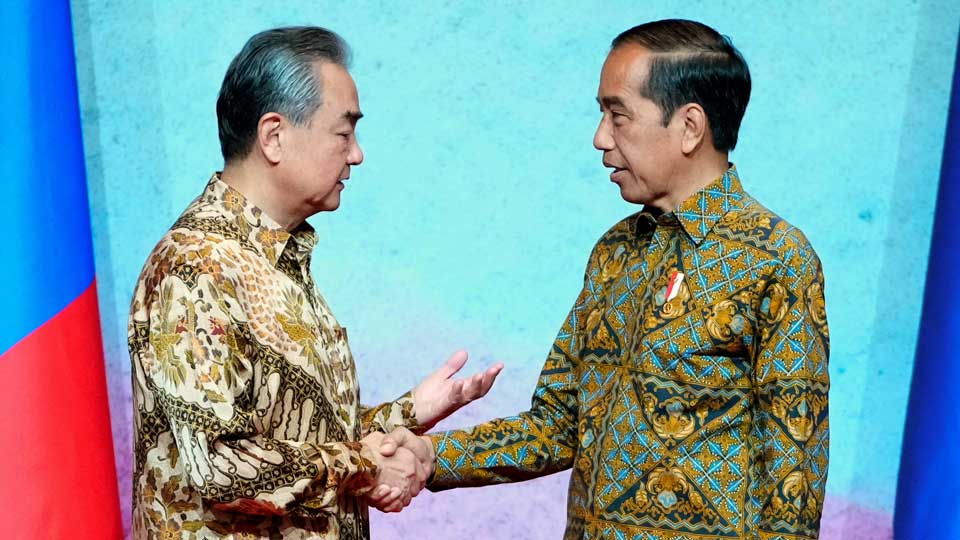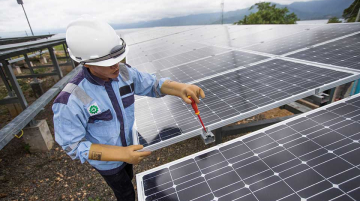
“If Liong-Barongsai from China works together with Nandi Cows from India, with Sphinxes from Egypt, with Peacocks from Burma, with White Elephants from Siam, with Hydra Snakes from Vietnam, with Tigers from the Philippines and with Bulls from Indonesia, then surely the international imperialism and colonialism will be crushed,” wrote Soekarno, the first President of Indonesia, in his book entitled ‘Under the Flag of the Revolution.’
It appears that Soekarno’s quote could regain relevance for Indonesians today as we chart the waters of international cooperation for energy transition to reduce greenhouse gas emissions, one of the leading causes of the climate crisis. As new details about the much-discussed Just Energy Transition Partnership (JETP) climate financing scheme emerge, local experts are starting to criticize the proposed scheme as a potential revival of colonialism, a new tool for the West to dominate the Global South.
Could unity among Asian nations, dreamt up by many Asian leaders, including Soekarno many decades ago, be the antidote? In the context of Indonesia’s efforts to combat the climate crisis, could working with China be our way forward?
Ecological disasters are now happening more frequently in various parts of the world. Policymakers around the globe are running against time to come up with solutions to this crisis. One of the most urgent steps to take is reducing the use of fossil energy and switching to renewable energy.
A transition like this is an enormous task for developing countries like Indonesia, which is still very dependent on fossil energy. It is incredibly expensive. Indonesian Minister of Finance Sri Mulyani revealed that based on her estimations, the country could require an investment of IDR 3,500 trillion, equivalent to over $230 billion, just to cut down emissions from the energy sector by three quarters.
The JETP climate financing scheme for Indonesia was secured last year at the G20 Summit in Bali. World’s wealthiest countries – the U.S., Japan, Canada, Denmark, France, Germany, Italy, Norway, the EU, and the UK – had agreed to provide $20 billion to help Indonesia with its energy transition. However, just last month, the Indonesian Ministry of Energy and Mineral Resources revealed the true composition of JETP’s funding.
It turns out that the portion of the grant and technical assistance allocated from the commitment is only around $160 million each. The rest of the funds would be given through foreign debts in the form of commercial loans with unknown interest rates.
Experts are now calling the scheme a potential “debt trap”. JATAM (Mining Advocacy Network), an Indonesian network of non-governmental and community-based organizations working on environmental and human rights issues, has called JETP “exploitative” and a “wrong answer to the climate crisis”. This is not to mention the fact that rich countries have been massive pollutants of the earth for much longer than Indonesia and that now, they are refusing to pay for their ecological sins. Let’s not forget that at the moment, the U.S. is already the Indonesian government’s largest creditor, followed by Japan, Germany, and France (with China coming only fifth).
The domination of foreign debt in JETP will extend the cycle of natural destruction in Indonesia. To pay off foreign debts, local governments in Indonesia must open their doors to investment. One sure way to attract investment is to relax environmental permits. As you can see, this is a downward cycle.
To avoid walking into the trap, the Indonesian government should find alternative funding outside the JETP.
Chinese financing could be an option the government should consider.
China’s Belt and Road Initiative (BRI), for example, could accelerate Indonesia’s goal to add 3.6 GW of solar energy in 2025, as suggested by Fabby Tumiwa, the Executive Director of the Institute for Essential Services Reform (IESR). Indonesia also still holds out hope that BRI could boost investment in the renewable energy component industry.
Nevertheless, treading the path of the China-Indonesia energy transition partnership and realizing its maximum potential will take work. Anti-communism sentiments fanned by some right-wing politicians and their supporters will hinder any further cooperation with China. For 32 years, the government under Indonesia’s second President Soeharto had carried out a massive anti-communist campaign. Even though President Soeharto stepped down in 1998, right-wing politicians and their supporters still see China as an enemy of Indonesia.
For China-Indonesia’s alliance to work, it must adopt a new strategy:
- First, China’s investment in the energy transition should not be dominated by foreign debt, as in the JETP scheme.
- Second, Chinese investment in Indonesia must also support the development of community-based renewable energy infrastructure.
This kind of infrastructure development fully engages with the local residents and listens to their needs. Some examples of successful projects can be found in Ciptagelar Village, West Java, and Manik Aji Village in Bali, where villagers independently built solar and hydropower plants to produce electricity.
The Indonesian State Electricity Company estimated that there are still around 4,700 villages across the country that have yet to have access to electricity. If China wants to invest, it can look into these villages and provide electricity for them using community-based renewable energy development. For Indonesia, opening the door for Chinese investment in this way can eliminate dependence on rich countries.
The direction of Indonesia’s climate strategy must be decided fast. Next year, the country will hold a presidential election that activists say is crucial for the fate of environmental and climate issues in Indonesia. Unfortunately, there is still a lack of clear vision from hopeful presidential candidates who are running for office. So far, no presidential candidate has spoken about the energy transition roadmap in Indonesia, let alone about the question of furthering cooperation with China, for fear of losing votes.
And so, it is no surprise that the words of Soekarno, the late first president who passed away more than 50 years ago, are still finding their way into Indonesia’s modern debates. In the absence of a definitive stance from our current leaders, those words, perhaps, are the best guide we have.
Firdaus Cahyadi is a longtime environmental consultant and a regular columnist for several of Indonesia’s largest news publications.







